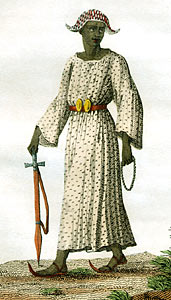Funj people: Difference between revisions
mNo edit summary |
Shepard363 (talk | contribs) m More details on the history of the Funj. Also misleading descriptions of their origins were taken out. |
||
| Line 1: | Line 1: | ||
[[File:King sennar 1821.jpg|thumb|A Sennar King around 1821, a member of the Funj ethnic group.]] |
[[File:King sennar 1821.jpg|thumb|A Sennar King around 1821, a member of the Funj ethnic group.]] |
||
The '''Funj''' are an ethnic group in present-day [[Sudan]]. The Funj set up the [[Funj Sultanate of Sinnar]] with [[Abdallah Jamma]] and ruled the area for several centuries. |
The '''Funj''' are an ethnic group in present-day [[Sudan]]. The Funj set up the [[Funj Sultanate of Sinnar]] with [[Abdallah Jamma]] and ruled the area for several centuries. The [[Funj]] risen in southern Nubia and had overthrow the remnants of the old Christian kingdom of Alwa. In 1504 a [[Funj]] leader named Amara Dunqas, founded the Black Sultanate at Sannar (the capital). The Black Sultanate soon became the keystone of the Funj Empire. It is cited that Islam was their practiced religion at the time due the spread of "Islamization", however many old pagan practices survived; it is almost as if the people still were in their hearts "pagans" rather than true followers of Islam, though it became their official religion. |
||
The origins of the Funj are not clearly known. However, there are three different hypotheses regarding their origin. |
The origins of the Funj are not clearly known. However, there are three different hypotheses regarding their origin. One source claims [[Funj]] are descendants of [[Banu Umayya]], who escaped the slaughter of the [[Abbasids]] by fleeing into [[Ethiopian Empire|Abyssinia]] and moving inward in to the [[Nubians|Nubian]] territory who had been known in [[Arabia]] since ancient times to protect guests and refugees. The second hypothesis comes from [[James Bruce]], who theorized in his book [[Travels to Discover the Source of the Nile]] that the Funj descend from the [[Shilluk people]]. [[James Bruce]] wrote his book after 22 years of travel through [[North Africa]] and [[Ethiopia]]. The third hypothesis is that they are descents of the remnants of the Kingdom of [[Alodia]] Nubians who escaped further south to replenish their supplies and resources and returned to establish their state. The most cited source is that they are Nubians who mixed with [[Arabs]]. |
||
==References== |
==References== |
||
<ref>https://www.globalsecurity.org/military/world/sudan/history-funj.htm</ref> |
|||
{{Reflist}} |
{{Reflist}} |
||
Revision as of 00:06, 14 April 2018

The Funj are an ethnic group in present-day Sudan. The Funj set up the Funj Sultanate of Sinnar with Abdallah Jamma and ruled the area for several centuries. The Funj risen in southern Nubia and had overthrow the remnants of the old Christian kingdom of Alwa. In 1504 a Funj leader named Amara Dunqas, founded the Black Sultanate at Sannar (the capital). The Black Sultanate soon became the keystone of the Funj Empire. It is cited that Islam was their practiced religion at the time due the spread of "Islamization", however many old pagan practices survived; it is almost as if the people still were in their hearts "pagans" rather than true followers of Islam, though it became their official religion.
The origins of the Funj are not clearly known. However, there are three different hypotheses regarding their origin. One source claims Funj are descendants of Banu Umayya, who escaped the slaughter of the Abbasids by fleeing into Abyssinia and moving inward in to the Nubian territory who had been known in Arabia since ancient times to protect guests and refugees. The second hypothesis comes from James Bruce, who theorized in his book Travels to Discover the Source of the Nile that the Funj descend from the Shilluk people. James Bruce wrote his book after 22 years of travel through North Africa and Ethiopia. The third hypothesis is that they are descents of the remnants of the Kingdom of Alodia Nubians who escaped further south to replenish their supplies and resources and returned to establish their state. The most cited source is that they are Nubians who mixed with Arabs.
References
External links
- . Encyclopædia Britannica (11th ed.). 1911.
